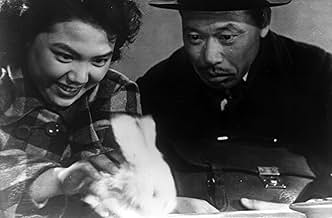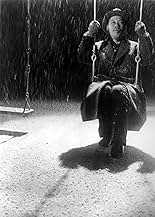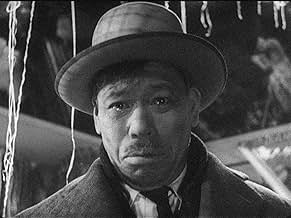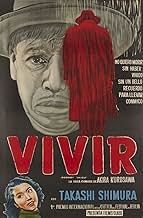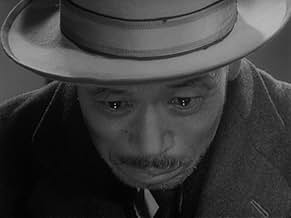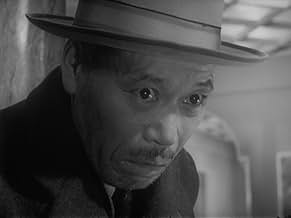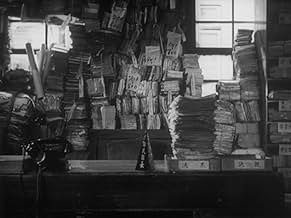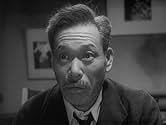A bureaucrat tries to find meaning in his life after he discovers he has terminal cancer.A bureaucrat tries to find meaning in his life after he discovers he has terminal cancer.A bureaucrat tries to find meaning in his life after he discovers he has terminal cancer.
- Director
- Writers
- Stars
- Nominated for 1 BAFTA Award
- 6 wins & 2 nominations total
- Director
- Writers
- All cast & crew
- Production, box office & more at IMDbPro
8.3100.2K
1
2
3
4
5
6
7
8
9
10
Featured reviews
A cinematic tour de force
"Ikiru" is supposedly one of Steven Spielberg's favourite films, and one can see the influence it's had on him not only in the sentimentality and the ultimate "feelgood factor" (which may be a little too extreme for some viewers, although the script never condescends), but visually, especially in the virtuoso sequence in which a reprobate leads our hero, a respectable and dull civil servant, on a whirlwind tour of Tokyo's frenzied nightlife - a masterpiece of camera placement and editing. With images throughout that will stay with you for a long time, and a terrific supporting performance by Miki Odagiri as a vivacious young "office lady", "Ikiru" is still an absolute knockout more than 50 years on.
To Live in Death
Probably one of the most difficult aspects a film like "Ikiru" has to overcome is the very rough march of time. To actually find someone these days, let's say a crowd of regular movie-goers to sit down and watch a film about an old Japanese man dying of cancer would be too much to ask.
Long held shots, hardly uplifting subject, to westerners very foreign. An array of reasons not to see it. And yet, once you actually start getting into the picture it doesn't let you go. Which is why it may be rightfully considered to be a classic.
Of all of Kurosawa's films this is probably the one movie that works perfectly on a universal level. Because at its core it is about one of the most basic desires of human existence...namely to be able to look back on your life and say "It was worth it."
In its starch and unforgiving black-and-white form the movie records the time of one man's life in such a beautiful and yes, colorful way, that by the time the final moments of the film play out, it will be very hard for anybody not to be touched. A glorious moment in 20th century cinema, that will hopefully be preserved for decades to come.
Long held shots, hardly uplifting subject, to westerners very foreign. An array of reasons not to see it. And yet, once you actually start getting into the picture it doesn't let you go. Which is why it may be rightfully considered to be a classic.
Of all of Kurosawa's films this is probably the one movie that works perfectly on a universal level. Because at its core it is about one of the most basic desires of human existence...namely to be able to look back on your life and say "It was worth it."
In its starch and unforgiving black-and-white form the movie records the time of one man's life in such a beautiful and yes, colorful way, that by the time the final moments of the film play out, it will be very hard for anybody not to be touched. A glorious moment in 20th century cinema, that will hopefully be preserved for decades to come.
Beautiful & touching, also very clever
This film touched me in a way no other film has. Filmed in black and white and gorgeous, both in the visuals and in how the story unfolds. Behold the clever manner of gradually unfolding the story as people jog each other's memories at his funeral (an obligation for them, that gradually turns into a real eulogy). Everything is told in flashbacks: the mourners' memories unfold naturally, as people remember what the man did and struggle to comprehend why.
This film I would nominate for the golden five of the century!
I first saw it in 1956 or so at a small theater in downtown Chicago. A second viewing, years later, confirmed my initial pleasure!
This film I would nominate for the golden five of the century!
I first saw it in 1956 or so at a small theater in downtown Chicago. A second viewing, years later, confirmed my initial pleasure!
10wobelix
Kurosawa is Kafka going Kawabata...
Being one of the Founding Fathers of Cinema, Kurosawa shines to all directions. In his diverse oeuvre it is hard, if not impossible, to find a weak work.
Ikiru is the most humane film of this grand Humanist. Kurosawa's story telling skills are sublime, and he has surpassed himself with this movie.
The slow pace and ditto camera movements (except in the night with 'Mephistofeles' where all is logically much more frantic) enhances the story superbly. What a pity some of the nowadays public can't find the tranquility and maybe serenity to watch a gorgeous film like that. That part of the movie lovers will miss a brilliant film, that would have lingered in the mind forever...
Ikiru is the most humane film of this grand Humanist. Kurosawa's story telling skills are sublime, and he has surpassed himself with this movie.
The slow pace and ditto camera movements (except in the night with 'Mephistofeles' where all is logically much more frantic) enhances the story superbly. What a pity some of the nowadays public can't find the tranquility and maybe serenity to watch a gorgeous film like that. That part of the movie lovers will miss a brilliant film, that would have lingered in the mind forever...
a cinematic experience that's a near-nexus of existentialism- life, living, dying, death, and can be done while alive- remarkable
Akira Kurosawa knew how to get in touch with human nature through his art. With his visual expressiveness and storytelling, he could pierce through his subjects, even in his big and occasionally comical samurai films, and find the elemental things do work. What he probably learned off of Rashomon probably helped out with Ikiru (To Live), a story of an old man who finds out he will die within a year, as both stories deal with perceptions of the significance of a life spent and a life wasted. Though that was to a different degree in Rashomon, with Ikiru Kurosawa expands into full-on existentialism.
The old man Kanji Watanabe (in a wholly believable and often heart-breaking performance by Takashi Shimura) knows his life hasn't amounted to much as a (chief) clerk for the city. He knows he hasn't had a great kinship with his son. He's accepting his fate with a heavy soul. One of the tenets of existentialism is that there's free-will, and the responsibility to accept what is done with one's life. Kurosawa might've (as I speculate, I don't entirely know) caught onto this for his lead, and it works, especially with the little details.
Such little details, unforgettable ones, have been expounded upon by other reviewers and critics, such as the drunken, sullen singing of "Life is short, fall in love my maiden" in the bar. A scene like that almost speaks for itself and yet it's also subtle. But one scene that had me was one not too many talk about. It's when Watanabe is in the Deputy Mayor's office, asking for permission so that a park can be built. At first the Mayor ignores him, but then Watanabe begs, but not in a way that manipulates the audience for sympathy with the old man. The mayor must be sensing something in his eyes, desperate and weak, however determined, and it's something that probably most of the audience can identify with as well, even if they don't entirely identify with the character.
But aside from the emotional impact Ikiru can have on a viewer, composition-wise (with the help of Asakazu Nakai, wonderful cinematographer on less than a dozen Kurosawa films) and editing-wise the film is ahead of its time and another example of Kurosawa's intuitive eye. There are some to-tomy shots sometimes (which could be called typical via master Ozu or other), but everything appears so precise on a first viewing, so descriptive. I think I almost can't go into all of them without a repeat viewing, but there were two that are still fresh in me. The first was right as Watanabe was about to sing in the bar, and there were these bead-strings looming in front of the camera. Perhaps mysterious, but definitely evocative.
The other was when Watanabe and one of the other clerks are on a bridge during a dark part of the day. Both characters are in silhouette, and Watanabe gives an indication to the character that he will die soon. But for me, I wasn't even paying a terrible amount of attention to the words. The way the two are lit as they are, with the light in the background and darkness in the foreground, it could maybe give an indication of what Kurosawa's trying to say: we're all not in the light of life, but it doesn't have to be an entire down-ward spiral if the will is good. Whether you're into philosophy (ies) or not, Ikiru won't disappoint newcomers to Kurosawa via his action pictures. A+
The old man Kanji Watanabe (in a wholly believable and often heart-breaking performance by Takashi Shimura) knows his life hasn't amounted to much as a (chief) clerk for the city. He knows he hasn't had a great kinship with his son. He's accepting his fate with a heavy soul. One of the tenets of existentialism is that there's free-will, and the responsibility to accept what is done with one's life. Kurosawa might've (as I speculate, I don't entirely know) caught onto this for his lead, and it works, especially with the little details.
Such little details, unforgettable ones, have been expounded upon by other reviewers and critics, such as the drunken, sullen singing of "Life is short, fall in love my maiden" in the bar. A scene like that almost speaks for itself and yet it's also subtle. But one scene that had me was one not too many talk about. It's when Watanabe is in the Deputy Mayor's office, asking for permission so that a park can be built. At first the Mayor ignores him, but then Watanabe begs, but not in a way that manipulates the audience for sympathy with the old man. The mayor must be sensing something in his eyes, desperate and weak, however determined, and it's something that probably most of the audience can identify with as well, even if they don't entirely identify with the character.
But aside from the emotional impact Ikiru can have on a viewer, composition-wise (with the help of Asakazu Nakai, wonderful cinematographer on less than a dozen Kurosawa films) and editing-wise the film is ahead of its time and another example of Kurosawa's intuitive eye. There are some to-tomy shots sometimes (which could be called typical via master Ozu or other), but everything appears so precise on a first viewing, so descriptive. I think I almost can't go into all of them without a repeat viewing, but there were two that are still fresh in me. The first was right as Watanabe was about to sing in the bar, and there were these bead-strings looming in front of the camera. Perhaps mysterious, but definitely evocative.
The other was when Watanabe and one of the other clerks are on a bridge during a dark part of the day. Both characters are in silhouette, and Watanabe gives an indication to the character that he will die soon. But for me, I wasn't even paying a terrible amount of attention to the words. The way the two are lit as they are, with the light in the background and darkness in the foreground, it could maybe give an indication of what Kurosawa's trying to say: we're all not in the light of life, but it doesn't have to be an entire down-ward spiral if the will is good. Whether you're into philosophy (ies) or not, Ikiru won't disappoint newcomers to Kurosawa via his action pictures. A+
Did you know
- TriviaWhen Takashi Shimura rehearsed his singing of "Song of the Gondola," director Akira Kurosawa instructed him to "sing the song as if you are a stranger in a world where nobody believes you exist."
- GoofsWhen Kanji and the Novelist go to a busy, loud nightclub, the film has been reversed as evidenced by the backwards "Nippon Beer" banner in the background.
- ConnectionsFeatured in The Siskel & Ebert 500th Anniversary Special (1989)
- SoundtracksJ'ai Deux Amours
(uncredited)
Music by Vincent Scotto
Lyrics by Georges Koger and Henri Varna
Performed by Josephine Baker
[Played when entering the bar with the long-faced man]
Details
Box office
- Gross US & Canada
- $60,239
- Opening weekend US & Canada
- $2,149
- Dec 29, 2002
- Gross worldwide
- $114,026
- Runtime
- 2h 23m(143 min)
- Color
- Sound mix
- Aspect ratio
- 1.37 : 1
Contribute to this page
Suggest an edit or add missing content

![Watch Trailer [OV]](https://m.media-amazon.com/images/M/MV5BMTg4OWJkNjMtM2Y0Mi00MzQ5LTk3Y2YtZWMwNGUyOTIyNGVjXkEyXkFqcGdeQXRyYW5zY29kZS13b3JrZmxvdw@@._V1_QL75_UX500_CR0)
